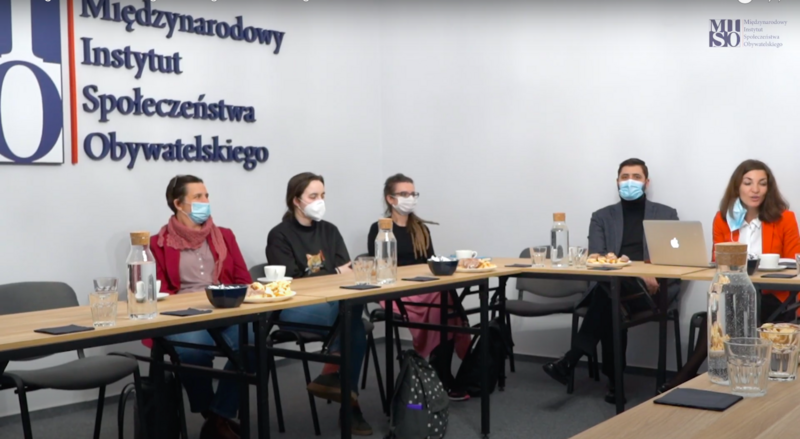Polish - U.S. Civil Society Roundtables - “Immigrants and Refugees Integration and Rights in Practice”
The meeting began with the keynote speaker’s talk about migration and a humanitarian crisis. At the outset Krish O'Mara Vignarajah emphasized her great support for Ukraine, while condemning Russia's armed aggression. Then, she discussed some activities of Lutheran Immigration and Refugee Service, and shared with the participants her knowledge and experience in developing the concept and method of relocating refugees to the US.
Lutheran Immigration and Refugee Service (LIRS) is the largest denominational non-profit organization dedicated to helping immigrants, asylum seekers and refugees in the US. “Simply put, we resettle refugees, reunite children and parents, and revive the legendary American Dream,” the speaker said. For more than 80 years, LIRS has been supporting migrants and refugees from all over the world. The organization's work has changed the lives of more than 500,000 people who have sought safety in the United States. LIRS' history reflects deep immigrant roots and commitment to welcoming foreigners, especially those most in need. “Driven by our Lutheran faith and decades of experience with migrants and refugees, we have responded to the needs of people involved in conflicts and struggling with persecution. We have developed new support programs, established new aid organizations and influenced public policy in the best interests of those we serve - Krish O'Mara Vignarajah noted.
LIRS began its operations when New York-based National Lutheran Council (NLC), founded in 1918 to address such post-World War I needs as immigration and refugee resettlement, set up a Department of Social Welfare with a “Lutheran Refugee Relocation” division. In its first year, it helped 522 refugees. Immediately after World War II, LIRS resettled 30,263 displaced persons from Germany and Eastern Europe.
“The LIRS community network has grown over the years to the point where a person in need of assistance can find a volunteer of the organization who will take appropriate steps to ensure that the person is properly assisted right at the airport, in any US state,” the speaker stressed. The comprehensive care guaranteed by LIRS also includes assistance with administrative matters. The entire assistance program aims at making refugees and immigrants self-sufficient and successfully integrated into local communities. The initiative is primarily funded by the US State Department and the Health and Social Care Service.
LIRS also works with some 100,000 volunteers who offer their full support and commitment, making the entire process of welcoming and assisting migrants well organized and efficient - from picking up families from airports to adjusting children to the school system. According to Krish O'Mara Vignarajah, “the volunteers are a key part of the entire process. We are able to directly get them engaged in real assistance.”
Krish O'Mara Vignarajah also stressed that immigrants in the US were in great need. “In a country as big as the United States, the need for people in various areas is constantly increasing, especially now with the decline in the birth rate,” the speaker pointed out. In addition, LIRS focuses on involving an entire community in the process of welcoming migrants, with the government, nonprofit organizations, private sector and individuals being key elements that serve that purpose.
After her speech Krish O'Mara Vignarajah answered questions from the participants of the meeting. Among other things, she emphasized the importance of the integration process for refugees and asylum seekers, and gave numerous examples of prejudice and xenophobia against refugees that she had observed over the years during her work at LIRS structures. The keynote speaker talked about prejudice in American and European societies, especially against Syrian and Afghan refugees. Participants of the meeting also exchanged their perceptions and experiences in helping refugees and migrants.
“Polish-U.S. Civil Society Roundtables” is a project implemented by the International Institute of Civil Society and the U.S. Embassy in Poland. These are cyclical meetings with the participation of American experts, in a roundtable format, on the development of civil society in selected thematic areas. The aim of the project is to exchange Polish and American experiences in improving civic competence and the development of civil society, with a particular focus on human rights, disinformation, media freedom, fundraising, and diversity and tolerance - depending on the topic of a given meeting. The format of each meeting includes an online speech by an American expert who presents an American perspective to the Polish audience gathered at MISO headquarters. Then, the moderator opens a discussion focused on sharing experiences and best practices (with the participation of the US expert). The project is aimed at NGO and civil society leaders, lawyers, representatives of public administration, business and academia.


